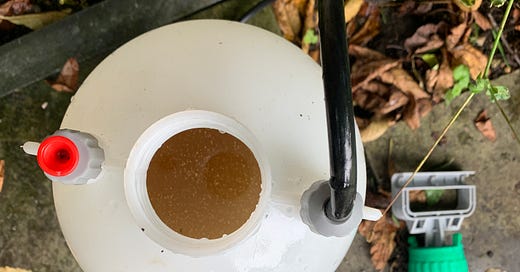#7 Using teas to fertilise & grow stronger plants
How agroecology can help you and your garden grow
A series exploring agroecological practises and how they can be utilised in our gardens and plots.
The use of artificial chemicals is one of the main differences between Organic and Regenerative farming.
“Under the Soil Association’s organic standards, all weedkillers are banned, and farmers are only able to use a very limited number of naturally-derived pesticides as a last resort (like citronella and clove oil), but only under very restricted circumstances.
Instead of relying on pesticides, organic farmers aim to create a natural balance between plants and animals to prevent pests.”
Synthetic fertilisers are avoided in Organic farming too.
Keeping soils healthy is at the heart of both Organic and Regenerative farming but in practise, regenerative farming still might use synthetic and toxic chemicals to control pests, kill weeds and feed the soil and plants.
For a long time, as a Gardener and Designer, we (the design and build company I worked for) often sprayed off gardens with glyphosate to make it ‘easier’ to work. I last used it 15 years ago and remember worrying how it could really be safe if it was considered so bad to get on your skin.
I stopped using it and all artificial chemicals once I began to learn more about soils and natural plant growth. It is so obvious to me now that the whole garden or farm system is a holistic whole and every action has a reaction. More on this as we go on in the series, but if using chemicals is so destructive for soils, plants, wildlife and us (we are what we eat eat1 - I don’t want to eat chemicals) it is an obvious choice not to use them.
Keep reading with a 7-day free trial
Subscribe to Floral Notes to keep reading this post and get 7 days of free access to the full post archives.




